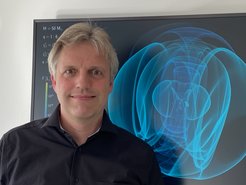Harald Pfeiffer elected Fellow of the American Physical Society
Prestigious honor for key contributions to the interpretation of gravitational-wave signals
Harald Pfeiffer, research group leader in the "Astrophysical and Cosmological Relativity" department at the Max Planck Institute for Gravitational Physics (Albert Einstein Institute) in Potsdam, has been elected Fellow of the American Physical Society (APS). This honor is bestowed only on half a percent of the about 55,000 APS members. It recognizes the awardee's outstanding contributions to physics.
The APS awarded the fellowship to Pfeiffer for "leadership and numerous high-impact research contributions to the field of numerical relativity, which have greatly helped to interpret gravitational-wave observations of binary black holes."
Numerical relativity for gravitational-wave astronomy

Harald Pfeiffer’s research focuses on a deeper understanding of the bizarre objects in our Universe that are governed by extreme gravity and on gravity itself. “I am trying to answer questions like: how does space and time behave when black holes collide? What are the properties of coalescing black holes and neutron stars in our universe? How does one program current and future supercomputers to study gravity?,” explains Pfeiffer.
Pfeiffer is developing the computational tools that solve Einstein’s highly complicated equations on supercomputers. He is also applying the resulting computer programs to study some of the most exciting events in the universe: The inspiral and the merger of pairs of black holes or neutron stars which generate gravitational waves. Such simulations provide crucial information for the gravitational-wave analyses of current detectors like LIGO, Virgo, and KAGRA. Future gravitational-wave detectors like the space-mission LISA (Laser Interferometer Space Antenna) will observe different types of systems (most notably, binaries where one partner is much less massive than the other one) which requires the development of new computational techniques. The higher sensitivity of future detectors also requires more accurate simulations to extract all science possible.
Harald Pfeiffer studied physics and mathematics in Bayreuth and Cambridge. He received his PhD in physics from Cornell University in 2003. After postdoctoral positions at the California Institute of Technology, he was Assistant Professor from 2009 - 2014 and Associate Professor from 2014 - 2017 at the Canadian Institute for Theoretical Astrophysics. Since 2017, Pfeiffer has been a group leader in the department of Astrophysical and Cosmological Relativity at the Max Planck Institute for Gravitational Physics in Potsdam and a professor at the University of Potsdam.
The American Physical Society is a non-profit membership organization of professionals in physics and related disciplines. Its mission is to promote and disseminate knowledge about physics. The Society publishes scientific journals, including the prestigious Physical Review and Physical Review Letters, and organizes more than twenty scientific meetings each year.












